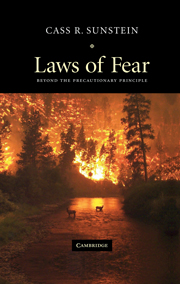Introduction
Published online by Cambridge University Press: 05 September 2012
Summary
This is a book about fear, democracy, rationality, and the law. Sometimes people are fearful when they ought not to be, and sometimes they are fearless when they should be frightened. In democratic nations, the law responds to people's fears. As a result, the law can be led in unfortunate and even dangerous directions. The problem cuts across countless substantive areas, including global warming, genetic engineering, nuclear power, biodiversity, pesticides, blood transfusions, food safety, cloning, toxic chemicals, crime, and even terrorism and efforts to combat it. “Risk panics” play a large role in groups, cities, and even nations.
DELIBERATION AND THEORY
How should a democratic government respond to public fear? What is the connection between fear on the one hand and law and policy on the other? I suggest that these questions are best approached if we keep two general ideas in mind. The first is that well-functioning governments aspire to be deliberative democracies. They are accountable to the public, to be sure; they hold periodic elections and require officials to pay close attention to the popular will. Responsiveness to public fear is, in this sense, both inevitable and desirable. But responsiveness is complemented by a commitment to deliberation, in the form of reflection and reason giving. If the public is fearful about a trivial risk, a deliberative democracy does not respond by reducing that risk. It uses its own institutions to dispel public fear that is, by hypothesis, without foundation.
- Type
- Chapter
- Information
- Laws of FearBeyond the Precautionary Principle, pp. 1 - 10Publisher: Cambridge University PressPrint publication year: 2005

